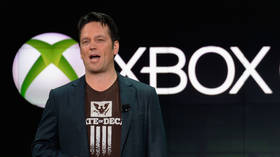Xbox is ‘not a free speech platform,’ says its head


Stating that Xbox and its services were “not a free speech platform,” Xbox head Phil Spencer proposed an industry-wide mechanism which would see players who are banned on one network automatically banned from all others.
In an interview with the New York Times, Spencer spoke about his visions for the future of the video game industry, the metaverse VR landscape, and Xbox’s plans to combat online harassment. On the latter topic, he mentioned introducing improved reporting tools, as well as developing an AI that can “monitor the sentiment of a conversation” and highlight when it is “getting to a destructive point.”
Asked his opinion on steps the industry should take in combating toxicity, Spencer said: “Areas where I think we need to continue to make progress, when I think about video and pictures and our ability to detect what’s happening in a video conversation – we don’t have as much of that that happens on Xbox Live because it’s not what it’s about. But just as I think as an industry, voice conversations and how do we monitor quickly, that’s an investment that we have a lot of work going on right now.”
“Something I would love us to be able to do – this is a hard one as an industry – is when somebody gets banned in one of our networks, is there a way for us to ban them across other networks?” he continued, speculating on possible solutions to the problem.
“Or at least as a player, for me to be able to bring my banned user list, because I can always block people from my play,” he explained. “And I’d love to be able to bring them to other networks where I play. So this is the group of people that I choose not to play with. Because I don’t want to have to recreate that in every platform that I play video games on.”
Spencer also mentioned that he doesn’t see Xbox as a First Amendment platform. “One of the things we’ve stated about our social network is we’re not a free speech platform. We’re a platform around interactive entertainment and video games. And we’re not there to allow all kinds of social discourse to happen on our platform. That’s not why we exist.”
He was then asked to compare social media companies and the gaming industry in their attempts to moderate content, to which he replied by praising the “transparency” of the gaming business model that revolved around players enjoying a game.
“If you like what you’re doing, you’re going to buy a disk or buy a game or buy an item in a game. And that means that my business thrives when people are happy and they’re playing on our platform and they’re investing in the content that’s there.”
Talking about social media sites such as Facebook and Twitter, Spencer noted how the clicks on those websites, which are the primary source of monetization, are driven by the most “tumultuous topics,” which is not the way it works in games.
“We don’t get paid on Xbox by how many times you click on something. I get paid by how many times your kids like playing Minecraft. And I do think that transparency in the gaming space means that we have to be very, very consistent with our customers. Because we almost more have a subscription relationship with our customer, that if you logged into Minecraft tomorrow and had a bad experience, you might never come back.”